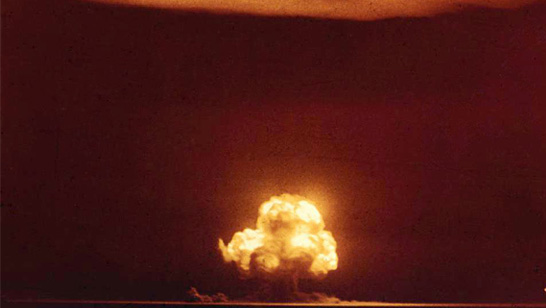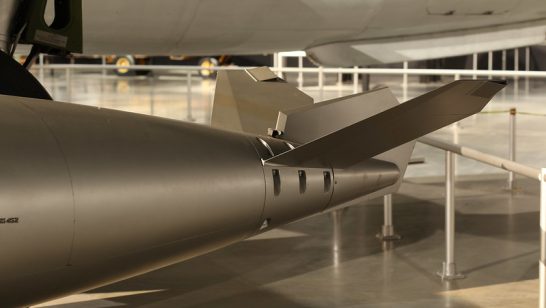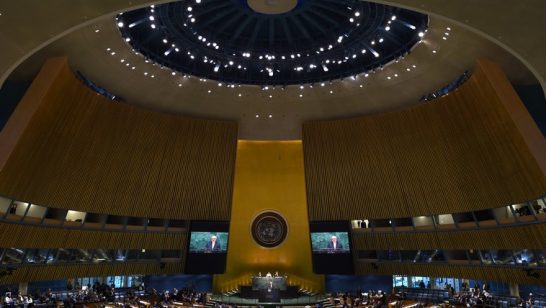
This commentary is the summary of a paper produced by the ELN, as part of our “Protecting the Non-Proliferation Treaty” project.
States Parties to the Treaty on the Non-Proliferation of Nuclear Weapons (NPT) set the framework for the next review cycle in their decision NPT/CONF.2020/DEC.2 at the 2022 Review Conference. In particular, by establishing a working group on further strengthening the review process of the Treaty, they gave a clear signal that substantial changes are required to set the NPT on a positive track after two review conferences that ended without an agreed final document.
Indeed, given the present stress on multilateralism and the nuclear arms control, disarmament and non-proliferation architecture, including the demise of arms control arrangements, disquieting trends in nuclear rhetoric and a perceived lowered threshold for the use of nuclear weapons (e.g. non-strategic nuclear weapons), as well as persistent risks of nuclear proliferation crises and proliferation dynamics, such a positive signal can only underline the continued relevance and viability of the NPT.
The discussion at the working group can draw on a considerable number of contributions by states parties, civil society, research centres and academia. It is therefore hoped that the working group in its proceedings and outcome will reflect the need for enhanced inclusivity in all its aspects, including the equal, full and effective participation and leadership of both women and men and further integration of gendered perspectives in the implementation of the Treaty.
Measures that would improve the effectiveness, efficiency, transparency, accountability, coordination, and continuity of the review process of the Treaty, as reflected in the tasking of the working group, are by their nature interrelated and interdependent and should be addressed incrementally and pragmatically to lead to concrete and tangible results.
In our analysis, it seems appropriate for the working group to concentrate on its deliberations on incremental and pragmatic reforms on:
- Adequate governance structures, particularly in the creation of a “Bureau”.
- Streamlining procedures and mechanisms concerning the role and proceedings of the Preparatory Committees and the proceedings of Review Conferences.
- Promotion of the full implementation of the Treaty, in particular reporting requirements on non-proliferation and disarmament obligations.
- Creating adequate institutional support.
Bureau
In order to allow for a greater degree of continuity and cohesion throughout the entire review cycle in terms of procedure and substance, a Bureau should be established at the beginning of the review cycle. The Bureau would consist of the President of the Review Conference and the chairs of the Preparatory Committees.
The Bureau should be tasked to elaborate a programme of work for the entire review cycle for decision at the first Preparatory Committee. The Bureau would, at the same time, amongst other things, receive and deliberate on complaints, for example, about non-compliance; act as a clearing house for information and reports; respond to significant cases affecting the integrity of the NPT and represent the Treaty in general.
Role of the Preparatory Committees
To avoid repetitive discussions at each Preparatory Committee, alternatives should be considered, e.g. by assigning at the outset of the review cycle focal areas for each of the Preparatory Committee, including but not limited to the three pillars of the NPT (i.e. peaceful uses, non-proliferation and disarmament). Thus, the Preparatory Committees could be enabled to concentrate on these focal areas, the proceedings possibly reflected in the form of a “rolling text” under the Chair’s responsibility. In parallel, Preparatory Committees should be in a position to respond to time-critical developments relative to the implementation of the NPT.
Proceedings at the Preparatory Committees
Given time constraints at Preparatory Committees, it seems appropriate to limit the time allocated to formal exchanges at the General Debate, or to eliminate the General Debate altogether, and to structure the Cluster debates more informally, in particular by organising interactive topical discussions on reports submitted by states parties, and by the inclusion of a broad range of stakeholders.
Proceedings at the Review Conference
Most high-level statements are delivered within the first few days of the general debate, and much of what is said is subsequently only repeated during main committees. Therefore, time limits could be placed on general statements delivered in the main committees. This more efficient use of time would allow for a greater substantive discussion of issues earlier on in the main committees.
The present structure of the three main committees, presided over by the chairs of the Preparatory Committees, has withstood the test of time. The Bureau should coordinate the work of the committees so that the substantive responsibility for preparing the report regarding each specific issue is undertaken in only one committee.
Since 2000 the President has taken over the drafting of decisions and final documents of the Review Conference. The President could more efficiently delegate these functions to a drafting committee.
Reporting
In order to assess the implementation across the three pillars of the Treaty, reporting on Treaty obligations is a key element, particularly regarding Article VI. However, in the past reports varied widely in terms of structure and detail. So that future reports are more comparable amongst themselves, a unified reporting template should be established. For Nuclear Weapons States, in particular concerning commitments under Art. VI, such reports should have a backwards-looking aspect, describing achievements in terms of nuclear disarmament and arms control and concrete plans for future undertakings. These reports should be examined in well-structured, dedicated and interactive sessions of the Preparatory Committees and the Review Conference, respectively, with the inclusion of a broad range of relevant states parties and non-state parties.
Institutional Support
In the past, the preparation and conduct of meetings throughout the review cycle has been ably assisted by the United Office for Disarmament Affairs. However, the creation of a small, dedicated implementation support unit should be considered in order to:
- Respond specifically to the administrative and logistical needs of the chairs.
- Assist and facilitate Treaty meetings and intersessional work.
- Provide advice, background documentation and analysis.
- Analyse and consolidate documents submitted to the Preparatory Committees and the Review Conference.
- Assist the chairs in preparing recommendations and decision-making.
- Promote continuity between and within review cycles and facilitate more informed planning and preparation for the review conferences.
- Coordinate with states parties, non-governmental entities and United Nations agencies.
By taking steps in such direction, NPT states parties would pave the way for more meaningful discussions in this Review Cycle and set the tone for a better outcome of the 11th NPT Review Conference in 2026. In these times of growing polarisation, these moves would represent a significant achievement and an indication that NPT members are willing to turn the tide on arms control, disarmament and nonproliferation.
The opinions articulated above represent the views of the author(s) and do not necessarily reflect the position of the European Leadership Network or any of its members. The ELN’s aim is to encourage debates that will help develop Europe’s capacity to address the pressing foreign, defence, and security policy challenges of our time.
Image credit: Wikimedia Commons / Government of Japan



